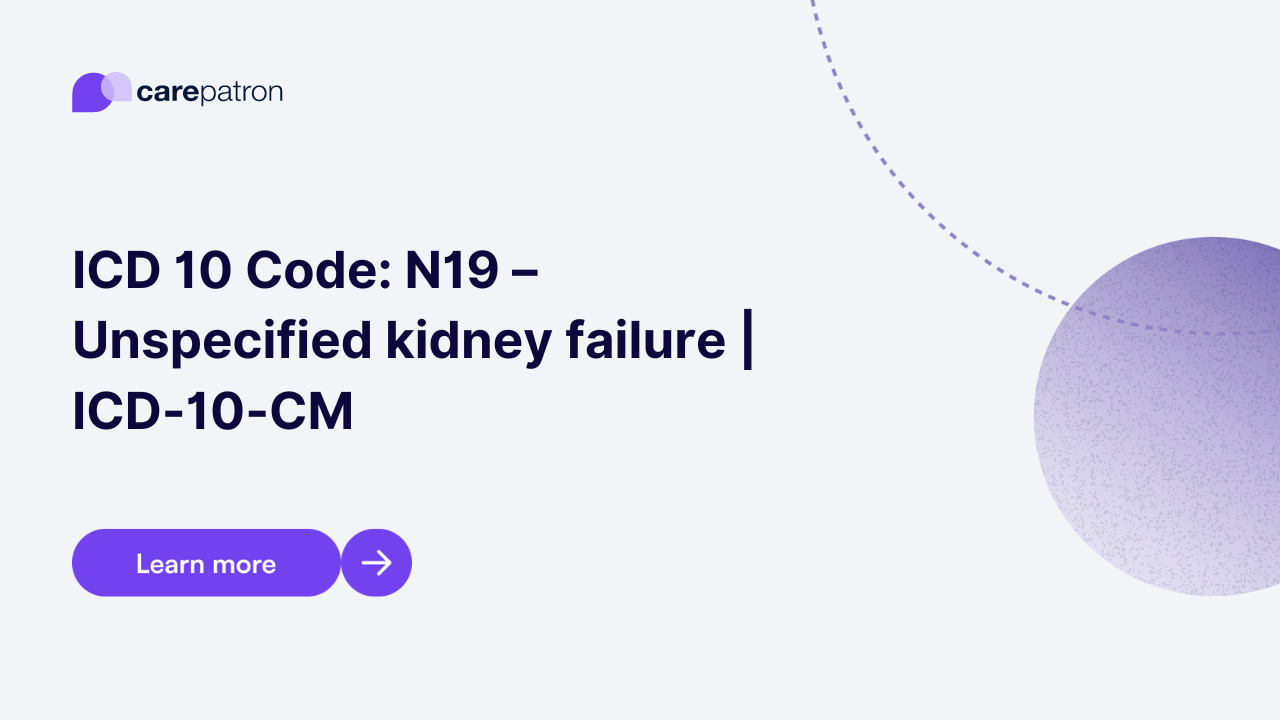
N19 Diagnosis Code: N19 – Unspecified kidney failure
The ICD-10 N19 diagnosis code is used to designate Unspecified kidney failure.
This ICD-10 code is meant to be used on a patient confirmed to have kidney failure, but one thing to note is that this code has an unspecified label. You should only use this if the specific type of kidney failure hasn’t been identified.
You need to determine if the kidney failure is acute or chronic. Once that’s been determined, you must use a more specific ICD-10 code instead. There are ICD-10 codes for acute and chronic kidney failure. If you need to search for chronic kidney failure codes, they have chronic kidney disease in their names.
Is N19 billable?
Yes. Even if this is an unspecified code, it is still valid and billable.
Clinical information about Kidney Failure:
Kidney Failure, sometimes referred to as renal failure, is the state in which the kidney's functions decline. These functions include:
- Filtering and getting rid of waste and excess fluid from the bloodstream
- The production of hormones that control our blood pressure
- The production of hormones that help with the production of red blood cells
- The regulation of electrolyte balance
The decline of these functions can lead to urine problems, loss of appetite, fatigue despite not having done anything strenuous, muscle cramps, and lower back pain, to mention a few.
It can also have consequences if not addressed as soon as possible, such as gout, anemia, heart problems, nerve damage, and more.
Acute kidney failure is the sudden loss of kidney function. It is often caused by another problem, such as taking too much of certain drugs, bacterial infections, or dehydration. The effects of this kind of kidney failure can be reversed if the underlying cause is addressed.
Chronic kidney failure (chronic kidney disease) is the slow, gradual decline of the kidney’s functions over the years. Underlying conditions also cause this but are likely more severe than the causes of acute kidney failure. Examples include diabetes, polycystic kidney disease, cardiovascular disease, and high blood pressure.
If chronic kidney disease isn’t addressed, it can lead to end-stage renal failure, which could end the patient's life. Relying on dialysis and kidney transplants are the only ways to help those at this stage.
Synonyms include:
- Absent renal function
- Chronic renal failure
- Chronic progressive renal failure
- Renal failure as a complication of care
- Renal failure associated with renal vascular disease
- Renal failure syndrome
- Renal failure syndrome co-occurrent with human immunodeficiency virus infection
- Non-functioning kidney
- N19
- N19 ICD 10
- ICD 10 N19
- ICD N19
- ICD 10 kidney failure
Other ICD-10 codes commonly used for kidney failure:
- N17.0 - Acute kidney failure with tubular necrosis
- N17.1 - Acute kidney failure with acute cortical necrosis
- N17.2 - Acute kidney failure with medullary necrosis
- N17.8 - Other acute kidney failure
- N17.9 - Acute kidney failure, unspecified
- N18.9 - Chronic kidney disease, unspecified
- I12.0 - Hypertensive chronic kidney disease with stage 5 chronic kidney disease or end stage renal disease
- N18.1 - Chronic kidney disease, stage 1
- N18.6 - End stage renal disease
How can Carepatron help with your ICD-10 needs?
Carepatron has an abundance of ICD-related guides that you can read! Our ICD guides are up-to-date and provide the necessary information when determining what ICD-10 codes you should use for your patients, especially when you need to refresh about particular codes or if you’re unsure.
Our ICD guides will not only inform you about the general information about the ICD-10 codes, but they will also inform you about the proper search terms for specific issues.
The guides will also inform you about clinical information regarding the issues the codes cover and whether the codes you plan on using are billable, if they’re unspecified, if they have specific labels like initial encounter and sequela, and which are exclusive to males and females.
Consider using our platform to help you prepare for ICD-10 coding processes, documentation, and billing!


.jpg)
